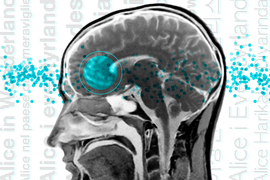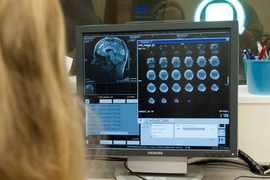A new study of people who speak many languages has found that there is something special about how the brain processes their native language.
In the brains of these polyglots — people who speak five or more languages — the same language regions light up when they listen to any of the languages that they speak. In general, this network responds more strongly to languages in which the speaker is more proficient, with one notable exception: the speaker’s native language. When listening to one’s native language, language network activity drops off significantly.
The findings suggest there is something unique about the first language one acquires, which allows the brain to process it with minimal effort, the researchers say.
“Something makes it a little bit easier to process — maybe it’s that you’ve spent more time using that language — and you get a dip in activity for the native language compared to other languages that you speak proficiently,” says Evelina Fedorenko, an associate professor of neuroscience at MIT, a member of MIT’s McGovern Institute for Brain Research, and the senior author of the study.
Saima Malik-Moraleda, a graduate student in the Speech and Hearing Bioscience and Technology Program at Harvard University, and Olessia Jouravlev, a former MIT postdoc who is now an associate professor at Carleton University, are the lead authors of the paper, which appears today in the journal Cerebral Cortex.
Many languages, one network
The brain’s language processing network, located primarily in the left hemisphere, includes regions in the frontal and temporal lobes. In a 2021 study, Fedorenko’s lab found that in the brains of polyglots, the language network was less active when listening to their native language than the language networks of people who speak only one language.
In the new study, the researchers wanted to expand on that finding and explore what happens in the brains of polyglots as they listen to languages in which they have varying levels of proficiency. Studying polyglots can help researchers learn more about the functions of the language network, and how languages learned later in life might be represented differently than a native language or languages.
“With polyglots, you can do all of the comparisons within one person. You have languages that vary along a continuum, and you can try to see how the brain modulates responses as a function of proficiency,” Fedorenko says.
For the study, the researchers recruited 34 polyglots, each of whom had at least some degree of proficiency in five or more languages but were not bilingual or multilingual from infancy. Sixteen of the participants spoke 10 or more languages, including one who spoke 54 languages with at least some proficiency.
Each participant was scanned with functional magnetic resonance imaging (fMRI) as they listened to passages read in eight different languages. These included their native language, a language they were highly proficient in, a language they were moderately proficient in, and a language in which they described themselves as having low proficiency.
They were also scanned while listening to four languages they didn’t speak at all. Two of these were languages from the same family (such as Romance languages) as a language they could speak, and two were languages completely unrelated to any languages they spoke.
The passages used for the study came from two different sources, which the researchers had previously developed for other language studies. One was a set of Bible stories recorded in many different languages, and the other consisted of passages from “Alice in Wonderland” translated into many languages.
Brain scans revealed that the language network lit up the most when participants listened to languages in which they were the most proficient. However, that did not hold true for the participants’ native languages, which activated the language network much less than non-native languages in which they had similar proficiency. This suggests that people are so proficient in their native language that the language network doesn’t need to work very hard to interpret it.
“As you increase proficiency, you can engage linguistic computations to a greater extent, so you get these progressively stronger responses. But then if you compare a really high-proficiency language and a native language, it may be that the native language is just a little bit easier, possibly because you've had more experience with it,” Fedorenko says.
Brain engagement
The researchers saw a similar phenomenon when polyglots listened to languages that they don’t speak: Their language network was more engaged when listening to languages related to a language that they could understand, than compared to listening to completely unfamiliar languages.
“Here we’re getting a hint that the response in the language network scales up with how much you understand from the input,” Malik-Moraleda says. “We didn’t quantify the level of understanding here, but in the future we’re planning to evaluate how much people are truly understanding the passages that they're listening to, and then see how that relates to the activation.”
The researchers also found that a brain network known as the multiple demand network, which turns on whenever the brain is performing a cognitively demanding task, also becomes activated when listening to languages other than one’s native language.
“What we’re seeing here is that the language regions are engaged when we process all these languages, and then there’s this other network that comes in for non-native languages to help you out because it’s a harder task,” Malik-Moraleda says.
In this study, most of the polyglots began studying their non-native languages as teenagers or adults, but in future work, the researchers hope to study people who learned multiple languages from a very young age. They also plan to study people who learned one language from infancy but moved to the United States at a very young age and began speaking English as their dominant language, while becoming less proficient in their native language, to help disentangle the effects of proficiency versus age of acquisition on brain responses.
The research was funded by the McGovern Institute for Brain Research, MIT’s Department of Brain and Cognitive Sciences, and the Simons Center for the Social Brain.











